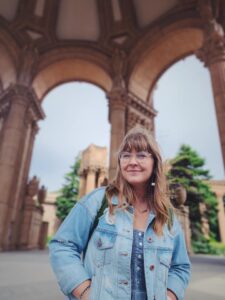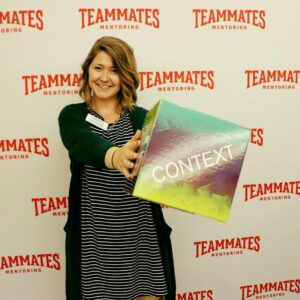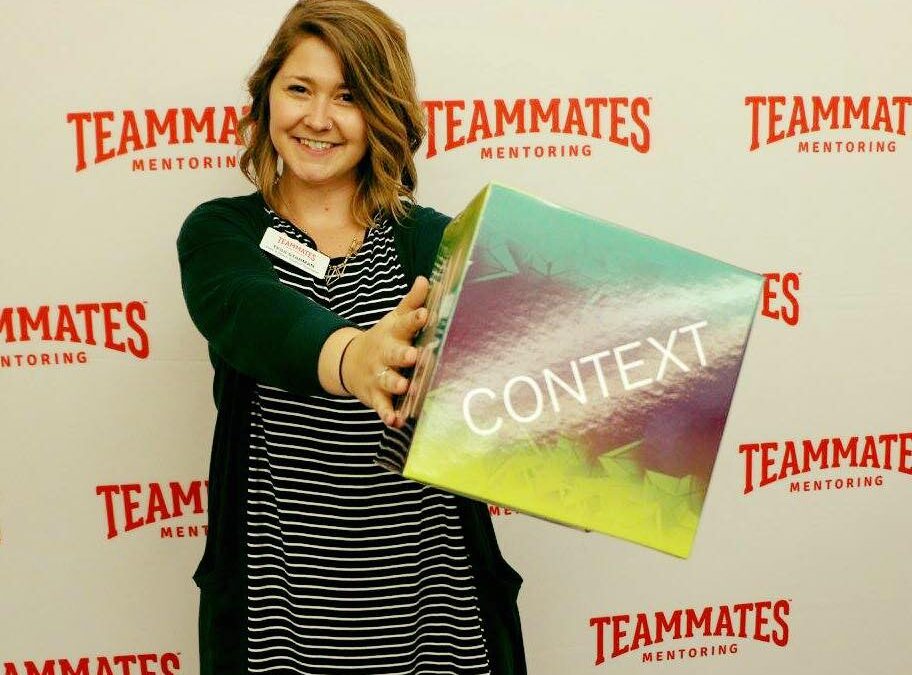Student Spotlight
Tess Starman
Tell us about yourself.
I am originally from Minnesota and currently reside in Omaha, Nebraska. I have my undergraduate degree from Creighton University with a double major in Sociology and Cultural Anthropology. At present, I work as the Researcher for TeamMates Mentoring Program, a regional school based adult-youth mentoring program. As the researcher, I oversee all data collection, database management, as well as process and outcome evaluations for the program. In essence, I prove that the impact we say we make in the lives of young people is the impact we actually have.
In my free time, I love to run. I ran two half marathons this past year and have another race planned for the spring. I also love to read. I will read just about any book that is recommended to me, but my personal favorite genres are social commentary, historical biographies, and personal development. I also am a big travel fanatic, which has proven difficult during 2020. I lived in Denmark for a year in college and I have travelled to 32 different countries so far. I hope to be able to travel again soon!
 What degree are you completing and what brought you here?
What degree are you completing and what brought you here?I am completing my Masters of Arts in Theology. I was initially drawn to ACU after I graduated from Creighton because I desired to learn more about God and scripture on my own terms. God has always worked in my life by appealing to my rational nature; when I have been at cross roads or in difficult moments, God speaks to me clearly in a pragmatic and logical way. All the details suddenly make sense and there is a resounding peace in my spirit. This has often come to me in the context of exploring and contemplating the deep theological and philosophical questions in life. I aimed to find a context to continue this exploration in my own spiritual formation, while simultaneously discerning my professional calling. The choice to come to ACU and pursue graduate theological education was one of those cross roads where it all just made sense. My admissions counselor and the faculty I spoke to during the application process made me feel like ACU was the place I could explore these questions. Other theology programs seemed like their goal was to churn out MDivs on a timed calendar with high achievement rates. ACU, from the very beginning, felt like a place and space where I could take my time, open my ears to God, and be formed for the future.
What sort of context do you plan to be working in?
I just finished submitting PhD applications in the field of Sociology of religion. My thesis work here at ACU is a continuation of my undergraduate research, examining the links between social factors and religious beliefs and practices. The relationship between social sciences and theology has historically been rife with tension. I find this perplexing because both fields have so much to give to each other to make the world a more just and benevolent place. I aim to apply all that I have learned at ACU and all the ways I have grown through my time here in the context of PhD work. God has always called me to wrestle with the difficult questions and I desire to continue to do so at the intersection of sociopolitical culture and faith.
What’s been the most challenging part of your education?
Personally, the most challenging part of my time at ACU has been striking a balance in my life. I am a distance student with a full time job and a host of other responsibilities. Education is my number one priority personally as it is where I feel called to and where I also feel most alive. However, with many other responsibilities in my life vying for my attention, my school work can sometimes take a back seat. Working for a school based non-profit, my priority this year has been working extensively to ensure our services are adapted to an online space to accommodate virtual learning. Consequently, as of late, I feel as if I have become a “master of none” as my attention and time has become so overloaded with many responsibilities. Like many of the other graduate students I have met at ACU, our education is not our only priority. As a result, my greatest spiritual practice this year has been prayerfully bringing my “to do” list before God and allowing God to work in and through me to make it all happen.
 What’s been your favorite part?
What’s been your favorite part?There are so many favorite parts, it is difficult to choose! If I had to summarize it down to one area, I believe I would say the intentionality of the faculty has been my favorite part. Despite being a distance student, I have never felt disconnected from the school. From the very beginning, I felt like I belonged at ACU, despite not even stepping foot on campus in Abilene until a year and a half into my degree. This sense of connection and belonging came primarily from the faculty members who have taught me. It came in the form of Dr. Mindi Thompson, who will always create space for a phone call or dinner while I am in Abilene, and doing all she can to ensure I am set up for success. It came in the form of Dr. Kelli Gibson who was so willing to adapt her classes to include one distance student. It came in the form of Dr. Fred Aquino, who has always pushed me to think differently, write differently, and continually expand my mindset. These professors, and many more not mentioned, have served as my mentors, guides, critics, and greatest source of support. Having someone who believes in you, extends grace to you, and will always stand by you, changes you for the better. That is the greatest gift ACU has given me.
What do you think is the most important thing you’ve learned so far?
I think the most important thing I have learned so far is that there is solidarity in my questioning and desire for deeper dialogue. In many of my contexts in life, people ask simple questions that beget simple answers. I have never functioned this way. I have always had a strong desire to wrestle with the biggest, most difficult, and often most contentious questions of life. Before coming to ACU, it sometimes felt like I was alone on this path of inquiry. However, through my classes here, I found like-minded students and faculty whose time is primarily focused on these questions in the same way. It felt reassuring to know that there are others out in the world asking the same difficult questions I was, and that to muse or even voice these questions wasn’t a contradiction to my faith, but rather a way to deepen it.
Do you have any advice for folks considering theological education?
I think people often pursue education as a means to an end: that education is for the purpose of a degree which will lead to a desired profession. While there is nothing inherently wrong with this purpose for pursuing education, it is not the only purpose. Education can, and often is, a means to its own end. Through the classes, mentorship, and formation here at ACU, I have been formed into a better version of myself. I will walk away stronger, more enlightened, and more assured of my calling and God’s presence than when I first began my education. If my life looks exactly the same one year after I graduate, I can rest assured that the work that God, ACU, and I did during my time here still accomplished its goal. If you are considering education, especially if you do not have a clear “end goal”, my advice would be to take the plunge anyway. Chances are, the process of education itself will serve as the greatest tool for formation and discernment in your life.

